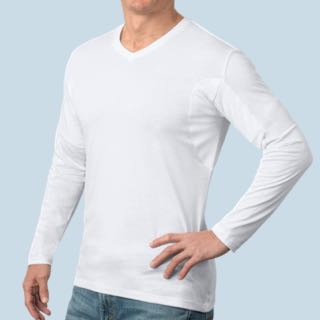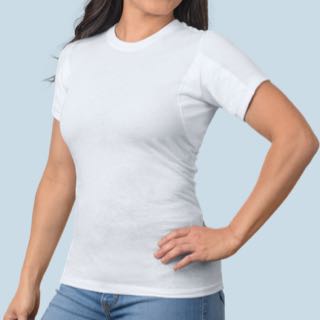Your Hyperhidrosis Medication Guide
If you have hyperhidrosis, you’re probably looking at remedies to treat excessive sweating, including oral medications.
Oral medication for excessive sweating works by disrupting some of your body's natural processes. Some oral medications block neurotransmitters, while others block adrenaline, which eases anxiety in stressful situations.
This guide will walk you through the different oral medications for hyperhidrosis. We’ll talk about side effects, common concerns about hyperhidrosis drugs and other alternatives to manage excessive sweat and improve your quality of life.
Jump straight to:
- Prescription Hyperhidrosis Medication
- Over-the-Counter Anti-Sweat Pills
- Other Hyperhidrosis Treatments
Prescription Hyperhidrosis Medication
Doctors often recommend prescription medications for severe cases of hyperhidrosis. They fall into several categories, each with its own set of benefits and considerations.
It's important to note that these oral medications are not specifically designed to treat hyperhidrosis. These drugs are FDA-approved for other medical conditions but can help with hyperhidrosis.
Anticholinergic Drugs
Anticholinergics are the most common oral medication for hyperhidrosis. Anticholinergics block chemicals that allow certain nerves to communicate, reducing body sweat.
It’s important to note that these medications don’t spot-reduce sweating. They cause a drying reaction over the entire body, even in areas where sweating isn’t an issue. It also means your body can't efficiently cool itself, putting you at risk of overheating.
If you’re an athlete, work or live in warm climates, exercise caution when taking anticholinergics for hyperhidrosis.
Anticholinergics are ideal for treating generalized hyperhidrosis i.e. excessive sweating of the entire body, excessive swearing of multiple body parts or large areas of the body (such as the back) that aren’t easily treatable.
Anticholinergics are prescribed off-label but considered effective based on years of anecdotal evidence. Common anticholinergic medications include:
|
Drug |
Description |
Side Effects |
|
Propantheline (Pro-Banthine) |
Used to treat hyperhidrosis, urinary incontinence, cramps and spasms of the stomach, intestines, and bladder. |
Dry mouth, blurred vision |
|
Glycopyrrolate (Cuvposa) |
Used to reduce excessive drooling and treat peptic ulcers. Used “off-label” as a hyperhidrosis medication. |
Dry mouth, difficulty urinating, headaches, diarrhea, and constipation |
|
Oxybutynin (Ditropan XL) |
Used to treat overactive bladders, incontinence and hyperhidrosis. |
Dry mouth, dizziness, drowsiness, blurred vision, dry eyes, nausea, vomiting, upset stomach, stomach pain, constipation, diarrhea, headache, unusual taste in mouth, dry/flushed skin, and weakness |
|
Benztropine (Cogentin) |
Used to treat Parkinson’s Disease, hyperhidrosis, and extrapyramidal symptoms (side effects associated with certain antipsychotic medications). |
Dry mouth, constipation, blurry vision, urinary retention, and cognitive impairment |
Beta-Blockers
Beta-blockers block the effects of stress hormones (adrenaline and noradrenaline) that trigger the body’s natural “fight or flight” response.
Blocking the body’s physiological response to stress eases nervous sweating. Common beta-blockers include propranolol (Inderal), which primarily treats abnormal heart rhythms and angina pectoris.
Beta-blockers are best for patients who experience hyperhidrosis episodes, particularly in cases where anxiety or stress triggers excessive sweating. Nerve-blocking medications can provide temporary relief for dealing with stress but aren’t a long-term solution.
The most common side effects of beta blockers include:
- Fatigue and dizziness
- Cold hands and feet
- Gastrointestinal symptoms
- Sexual dysfunction
- Weight gain
Read more: Considering Nervous Sweat Medications? Here’s What to Expect
NOTE: Do not abruptly stop taking a beta-blocker. Doing so can increase your risk of a heart attack or other heart problems.
Benzodiazepines
Benzodiazepines (or “benzos”) enhance GABA, a tranquilizing neurotransmitter in the brain. Similar to beta-blockers, benzodiazepines are not typically prescribed to treat hyperhidrosis directly. They are primarily used to manage anxiety and related conditions. However, in cases where anxiety or stress triggers excessive sweating, addressing the underlying anxiety with benzodiazepines may indirectly help with sweating control.
Common benzodiazepines include Xanax and Valium, which treat anxiety and insomnia.
The most common side effects of benzodiazepines can be significant and include:
- Drowsiness
- Depression
- Dependence and addiction
- Mental confusion
- Lack of motor control
- Blurred vision
- Slurred speech
NOTE: Benzodiazepines are habit-forming and intended for short-term use. Mixing alcohol with benzodiazepines can be fatal.
Other Prescription Hyperhidrosis Medications
Some people find success with other off-label prescription medications, including:
- Clonidine (Catapres): used for treating high blood pressure is an alpha-2 adrenergic agonist that can help reduce sympathetic nervous system activity, which plays a role in sweating
- Indomethacin (Indocin): used to treat arthritis pain and stiffness may be used in cases where hyperhidrosis is suspected to have an inflammatory component or when other treatments have not been effective.
- Gabapentin (Neurontin): used with other medications to prevent and control seizures may be prescribed off-label for individuals with hyperhidrosis, particularly when the condition is thought to have a neuropathic component.
- Hytrin: used to treat high blood pressure and enlarged prostate in men is given in cases where overactive sympathetic nervous system activity is suspected to contribute to excessive sweating.
It's important to emphasize that the use of these medications for hyperhidrosis should be determined by a healthcare provider after a thorough evaluation of the individual's specific condition.
Are There Any Over-the-Counter Anti-Sweat Pills Available?
As of October 2023, no anti-sweat pills over the counter (OTC) are available to treat hyperhidrosis. Most drugs commonly used to manage excessive sweating (like those listed above) require a prescription from a healthcare provider.
More Hyperhidrosis Treatments
Unfortunately, oral hyperhidrosis medications won’t help all excessive sweaters. However, there are several ways to help manage excessive sweating without medication. These include:
- Sweat proof undershirts: These specialized undershirts are designed to prevent sweat from reaching the outer layer of clothing, helping to keep the wearer dry and comfortable.
- Prescription-strength antiperspirants and anti-sweat wipes: These products contain higher concentrations of active ingredients (e.g., aluminum chloride) than regular antiperspirants and are applied to the skin to reduce sweating.
- Topical treatments: These may include prescription creams, gels, or solutions that can be applied to the skin to reduce sweating when applied to specific areas of the body.
- Botox injections: Botulinum toxin (Botox) is injected into the skin to block the release of acetylcholine, which reduces sweating in the treated area. It's commonly used for underarm hyperhidrosis.
- Iontophoresis: This non-invasive treatment involves immersing the affected body part in water while a medical device delivers a low electrical current. It's used primarily for palm and sole hyperhidrosis.
- MiraDry: A non-surgical procedure that uses microwave energy to selectively target and eliminate sweat glands in the underarm area, reducing sweating.
- Brella Patch: A wearable device placed on the skin to deliver a low-level electrical current, similar to iontophoresis, to reduce sweating in specific areas.
- ETS surgery: A surgical procedure that involves cutting or clamping the sympathetic nerves responsible for excessive sweating, typically used for severe cases of hyperhidrosis (we don’t recommend this!).
Thompson Tee: A Safe, Alternative Way to Deal With Excessive Sweating
While oral medications can offer relief from hyperhidrosis, they may not provide a foolproof solution and can come with side effects. Fortunately, there's a better way to deal with hyperhidrosis: Thompson Tee's sweat proof undershirts.
Join the thousands of satisfied customers who have found relief with Thompson Tee, the only patented sweat proof undershirt for both men and women. Don't let hyperhidrosis hold you back. Try Thompson Tee risk-free today and regain your confidence.
PLEASE NOTE: As with any medical-related issue, it's best to talk to your doctor or seek advice from a qualified medical practitioner. Do not use the information provided for diagnostic purposes or as a substitute for professional diagnosis and treatment.


